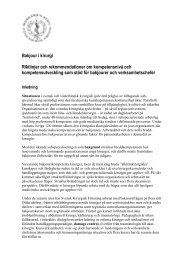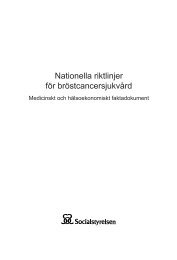Utbildningsboken revision 120808.pdf - Svensk Kirurgisk Förening
Utbildningsboken revision 120808.pdf - Svensk Kirurgisk Förening
Utbildningsboken revision 120808.pdf - Svensk Kirurgisk Förening
You also want an ePaper? Increase the reach of your titles
YUMPU automatically turns print PDFs into web optimized ePapers that Google loves.
95<br />
Utbildningsbok – Kirurgi<br />
System knowledge<br />
The surgical specialist should have knowledge of the health-care organization,<br />
management, economics and regulatory framework and its management for the best<br />
utilization of resources.<br />
Expertise in medical science and quality work<br />
Medical Science<br />
The surgical specialist should have a medically scientific vision and approach,<br />
knowledge of research methodology, including basic epidemiological concepts and methods<br />
of evidence-based medicine and review of scientific information.<br />
Improvement and quality work<br />
The surgical specialist should have knowledge and skills in evidence-based<br />
improvement and quality work. The aim is to initiate, participate in and be responsible for<br />
continuous improvement efforts with an emphasis on a holistic approach, patient safety,<br />
patient benefit, measurability and learning management to critically examine and evaluate<br />
their own activity.<br />
Public health and prevention<br />
The surgical specialist should have knowledge of health determinants, and other<br />
public health concerns and methods of health promotion and injury and illness prevention<br />
efforts so that this can be taken into account in the medical scientific work and quality.<br />
Educational Structure<br />
Early education and training in basic surgical technique is essential and should<br />
take place in both clinical and simulated environments in both core and branch specialities.<br />
Training in the initial treatment of acute surgical diseases should begin early and continue<br />
throughout the entire training of surgical treatment and aftercare.<br />
Training in surgical pathophysiology, basal pain management, critical care and<br />
the effects of anesthesia should take place in the early part of the training and constitutes the<br />
base for the more specialized training.<br />
The specialized training can begin in the first part of surgical training preferably<br />
with continuous training in a setting where large volumes of operative training can be offered.<br />
Training in gastrointestinal surgery is critical and should be given ample space. The main<br />
rotation should be halfway through the surgical training period. However, a shorter rotation<br />
may be appropriate early on to provide basic training in dealing with emergencies.<br />
Rotation in units treating breast surgery, endocrine surgery, vascular surgery and<br />
urological surgery should preferably take place during the end of the training.<br />
Courses, auscultations and theoretical studies are to be performed parallel with<br />
the corresponding clinical rotation whenever possible. The more specialized rotations should<br />
be as continuous as possible and should only be interrupted by unavoidable emergency room<br />
rotations or clinical courses.<br />
Communication skills, leadership skills and expertise in medical science and<br />
quality work should be initiated early and continued as a natural and integral part of the<br />
surgical training.





